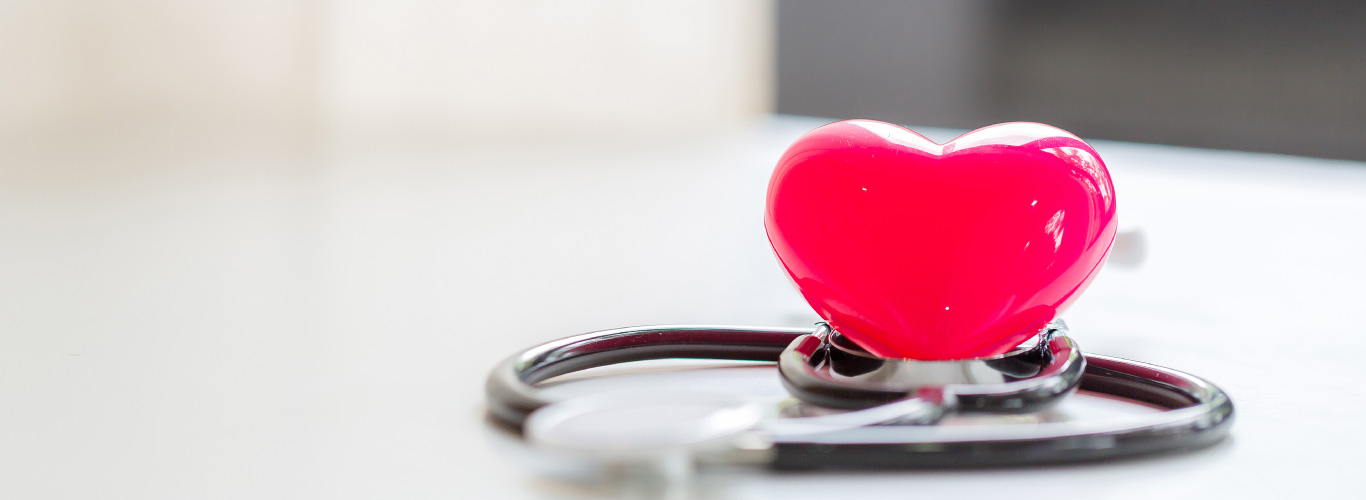High Blood Pressure, also known as hypertension, is sometimes called the “silent killer” because it can cause cardiovascular damage if left untreated, says Dr. Erin D. Michos.
When the pressure on the blood vessels during pumping of the blood by the heart increases up to higher levels, it causes High Blood Pressure. The increase in pressure is often due to the resistance present in the blood vessels. Narrower blood vessels increase this resistance. The long term exposure to this increased pressure on the blood vessels can cause High Blood Pressure.
Symptoms of High Blood Pressure
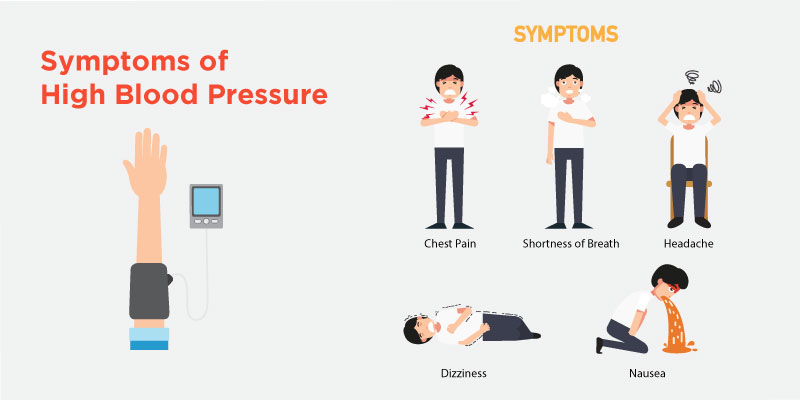
Contrary to popular belief that nosebleeds and headaches are symptoms of hypertension, most evidence suggests that this is not the case, at least not in life-threatening episodes. Many people with high blood pressure have no symptoms at all, making them a “silent killer,” said Dr. Erin D. Michos, M.D., an assistant professor of medicine at the University of California, San Francisco School of Medicine.
High Blood Pressure or Hypertension usually develops over the course of several years and hence there are typically no early symptoms of this condition. However, people with high blood pressure might show different symptoms, like:
- Shortness of breath
- Headaches
- Flushing
- Nosebleeds
- Chest Pain
- Visual Changes
- Blood in the urine
- Dizziness
The best way to monitor the blood pressure is to see the doctor, who can treat at home or in a doctor’s office. Moreover, it is suggested to check average blood pressure from home or using a device worn for 24 hours to measure blood pressure.
It is suggested to consult a doctor if a person notices symptoms of high blood pressure such as headache, dizziness, nausea, vomiting, diarrhea, or abdominal pain.
Causes and Risk Factors of High Blood Pressure
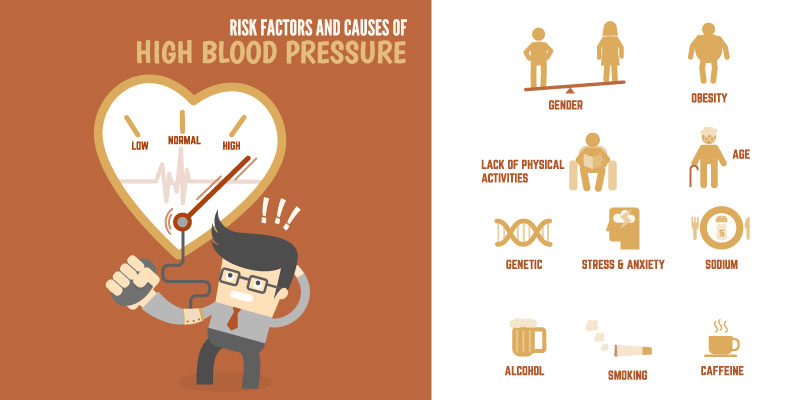
The causes depend on the type of Hypertension:
- Primary Hypertension: This type of hypertension develops over a long period of time and usually does not show any symptoms. It is the most common type of Hypertension. Although researchers are not sure what causes this type of condition, some factors may play a significant role such as genes, unhealthy lifestyle, and other physical changes in the body over time.
- Secondary Hypertension: As opposed to primary hypertension, secondary hypertension occurs quickly and hence can become more severe. This type of hypertension can be induced by kidney disease, congenital heart defects, problems with thyroid, alcohol abuse, obstructive sleep apnea, adrenal gland problems, etc.
High Blood pressure may have many risk factors, including:
- Age
- Family History
- Race
- Obesity
- Lack of physical activity
- Smoking or tobacco use
- High levels of salt in the diet
- Too much alcohol
- Low levels of potassium in the diet
- Stress
- Chronic conditions such as diabetes, kidney disease, and sleep apnea
- Sometimes, pregnancy
Hypertension is most commonly seen in adults. However, children may also be at risk of developing this condition. It is important to keep up with healthy lifestyle choices and consult the doctor for keeping the blood pressure checked regularly, especially if one notices the above-mentioned risk factors.
Diagnosis of High Blood Pressure
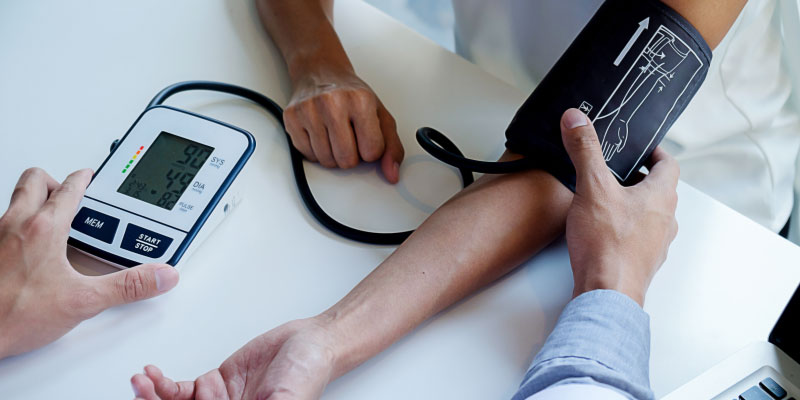
If the blood pressure is high, doctors will examine the eyes, heart, and nervous system to find evidence of damage caused by high blood pressure. High blood pressure can cause symptoms such as throbbing heartbeat, dizziness, nausea, vomiting, or diarrhea. If a person suddenly struck by a serious illness, he/she may not realize the damage silent hypertension does to the body.
Since systolic and diastolic blood pressure are two different categories, the doctor will classify the number in the higher category depending on the results of the test evidence. If it is a smaller number, the person will be sent back to the same doctor for further examination.
Several other tests may be required further to check any underlying condition, including:
- Cholesterol Screening
- Blood Tests
- Testing heart’s electrical activity with ECG test
- Ultrasound of heart and kidney
- Urine test
If the blood pressure is moderately high (140-90 mmHg or higher) and the doctor thinks the risk of developing cardiovascular disease in the next 10 years is more than a fifth, then he/she would prescribe medication and may advise a change in lifestyle. If there is a lower risk or if the doctor rates the risk of cardiovascular disease as low, then one can lower the blood pressure by making simple lifestyle changes.
High Blood Pressure and Other Problems
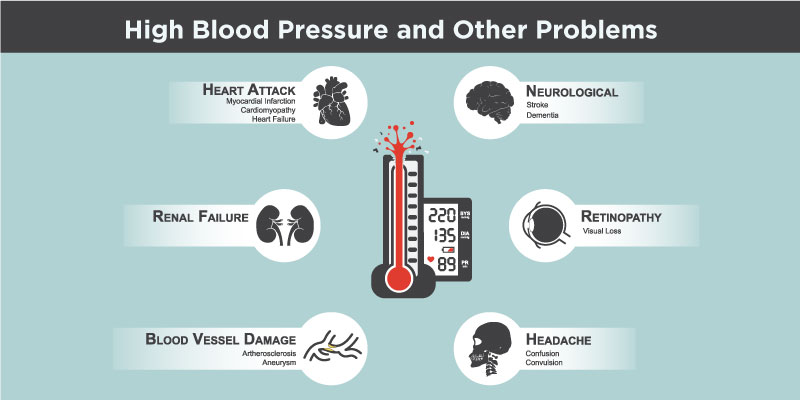
Since High Blood Pressure is related to the increased pressure on the blood vessels, it can cause other problems in various organs as well. High blood pressure can also be a sign of other health problems such as diabetes or stroke. If the high blood pressure is left untreated without any changes in the lifestyle, one may develop other conditions that may require further treatment. These conditions may include heart attack, stroke, aneurysm, weakened blood vessels in the kidneys, heart failure, metabolic syndrome, and dementia.
Conclusion
High Blood pressure is also known as Hypertension, which is caused by the long-term pressure on the blood vessels that can eventually cause health problems. It is important to keep the blood pressure monitoring regularly to better manage this health condition. If left untreated, high blood pressure can cause severe damage to the blood vessels, heart, and other organs of the body.
Consult the doctor for regular monitoring of the blood pressure and management with the appropriate medication and treatment prescribed by the practicing health care professional only.



